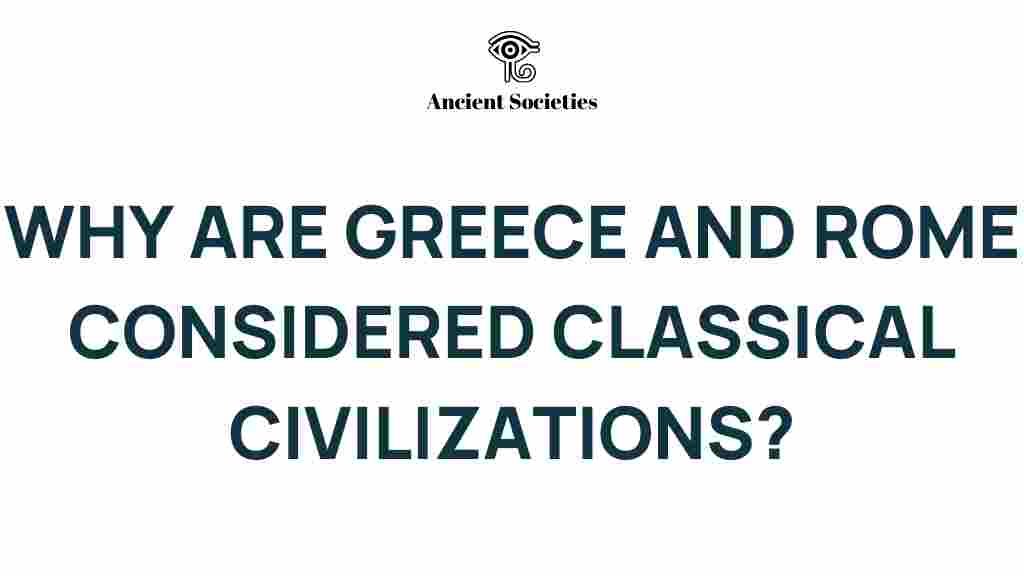The Enduring Legacy: Why Greece and Rome Define Classical Civilization
The civilizations of Greece and Rome have shaped the foundation of modern society in numerous ways. Their influence on culture, politics, philosophy, and art remains significant even today. This article explores how Greece and Rome define classical civilization, highlighting their contributions to ancient history and their lasting impact on contemporary governance, art, architecture, and democratic ideals.
Introduction to Classical Civilization
Classical civilization refers to the period of history that encompasses the cultures of ancient Greece and Rome. This era, spanning roughly from the 8th century BCE to the 6th century CE, was marked by remarkable advancements in various fields. Understanding this period is crucial for recognizing the roots of modern culture and societal structures.
The Cultural Influence of Greece and Rome
The cultural influence of Greece and Rome is pervasive. Both civilizations contributed significantly to various domains that still resonate in our daily lives:
- Philosophy: Greek philosophers like Socrates, Plato, and Aristotle laid the groundwork for Western philosophical thought.
- Governance and Democracy: Ancient Greece is often credited with the invention of democracy, a system that has influenced countless nations worldwide.
- Art and Architecture: Both civilizations produced iconic art and architectural feats that define beauty and functionality.
The Philosophical Foundations
Philosophy in ancient Greece set the stage for intellectual discourse and inquiry. The Greeks explored fundamental questions about existence, ethics, and knowledge, setting precedents that influence philosophical thought today.
Key figures in Greek philosophy include:
- Socrates: Known for his Socratic method, he encouraged critical thinking and dialogue.
- Plato: A student of Socrates, he founded the Academy in Athens and wrote works exploring justice, beauty, and equality.
- Aristotle: A student of Plato, he contributed to numerous fields, including logic, metaphysics, and biology.
Democracy and Governance
The concept of democracy as we know it today originated in ancient Greece, particularly in Athens. The Athenians established a system of direct democracy that allowed citizens to participate actively in political decision-making.
Key elements of Athenian democracy included:
- Ecclesia: An assembly of citizens that made decisions on laws and policies.
- Boule: A council that proposed legislation and managed daily government affairs.
- Sortition: The practice of randomly selecting citizens for public office, ensuring that leadership was accessible to all.
Rome further developed ideas of governance, transitioning from a republic to an empire. Roman contributions to governance include:
- The establishment of a Senate.
- The codification of laws, leading to the Twelve Tables.
- The concept of citizenship and legal rights.
Architectural Marvels
The architectural achievements of Greece and Rome showcase their artistic prowess and engineering capabilities. These structures have influenced architectural styles throughout history.
Greek Architecture
Greek architecture is renowned for its temples, theaters, and public buildings. Key features include:
- Columns: The use of Doric, Ionic, and Corinthian columns, each with distinct designs.
- Symmetry: Emphasis on proportion and harmony in design.
- Open-air Theaters: Such as the Theater of Epidaurus, which showcased the importance of drama and performance.
Roman Architecture
Roman architecture expanded on Greek principles while introducing new techniques and materials:
- Concrete: Allowed for more durable and flexible construction.
- Arches and Vaults: Enabled the creation of larger and more complex structures, such as aqueducts and amphitheaters.
- Public Buildings: Structures like the Pantheon and the Colosseum symbolize Roman engineering prowess.
Art: A Reflection of Society
Art in both Greece and Rome served as a reflection of societal values, religious beliefs, and political power.
Greek Art
Greek art is characterized by its focus on humanism, idealism, and the beauty of the human form:
- Sculpture: Notable works include the statues of gods and athletes, showcasing physical perfection.
- Pottery: Vases adorned with intricate designs and mythological scenes.
Roman Art
Roman art borrowed from Greek traditions but also focused on realism and portraiture:
- Realism: Emphasis on realistic depictions of individuals, particularly in busts and statues.
- Mosaics: Complex, colorful designs often used in public and private buildings.
The Enduring Legacy in Modern Society
The legacy of Greece and Rome is evident in numerous aspects of contemporary life:
- Political Systems: Many modern democratic systems are influenced by the principles of Athenian democracy.
- Legal Frameworks: Roman law serves as a foundation for many legal systems around the world.
- Cultural References: Literature, art, and philosophy from these civilizations continue to inspire modern creators.
Troubleshooting Tips: Understanding the Influence of Classical Civilization
As you explore the influence of Greece and Rome on classical civilization, consider the following tips:
- Compare and Contrast: Look at how different elements of Greek and Roman cultures influenced each other and diverged.
- Reflect on Modern Implications: Consider how ancient philosophies and governance systems inform contemporary issues.
- Engage with Primary Sources: Read works by ancient philosophers and historians to gain deeper insights into their thoughts and cultures.
Conclusion: The Lasting Impact of Greece and Rome
The civilizations of Greece and Rome have left an indelible mark on classical civilization and continue to shape our world today. Their contributions to philosophy, governance, art, and architecture are not merely historical footnotes but essential elements of our cultural heritage.
As we navigate the complexities of modern society, reflecting on the lessons from ancient Greece and Rome can provide valuable insights into democracy, governance, and human thought. To explore more about the impact of classical civilizations on modern life, visit this resource for detailed studies and analyses.
By understanding this enduring legacy, we can appreciate the profound influence that ancient history has on our present and future.
This article is in the category History and created by AncientSocieties Team
